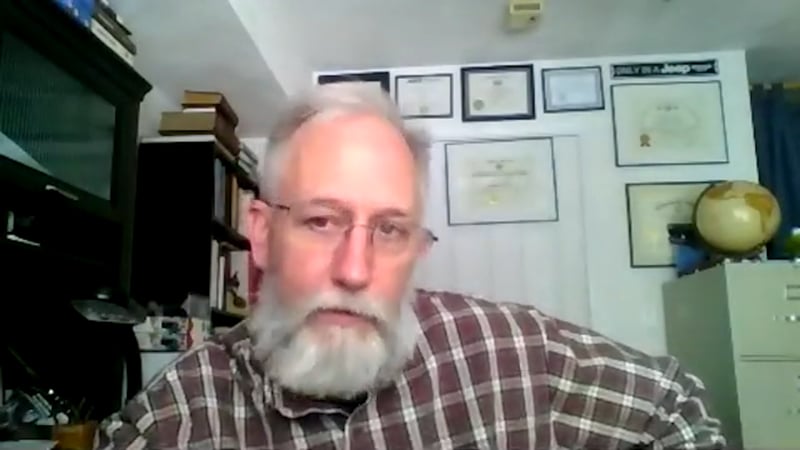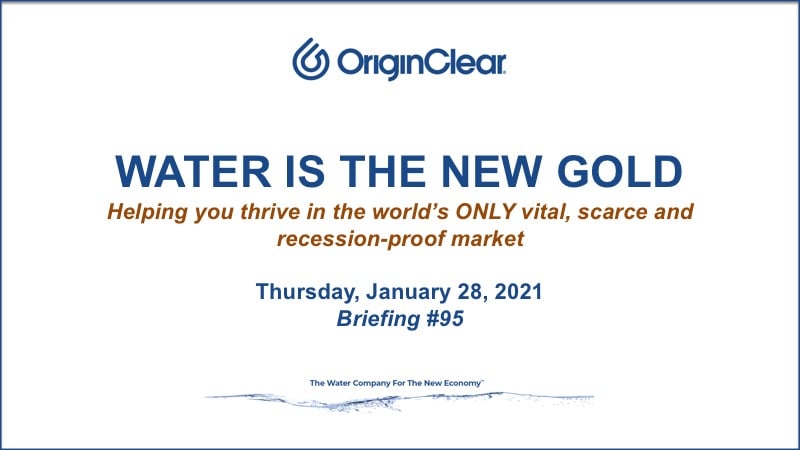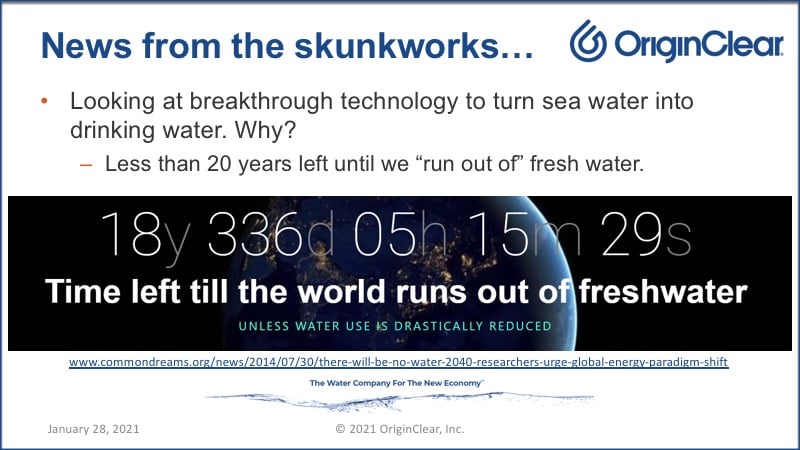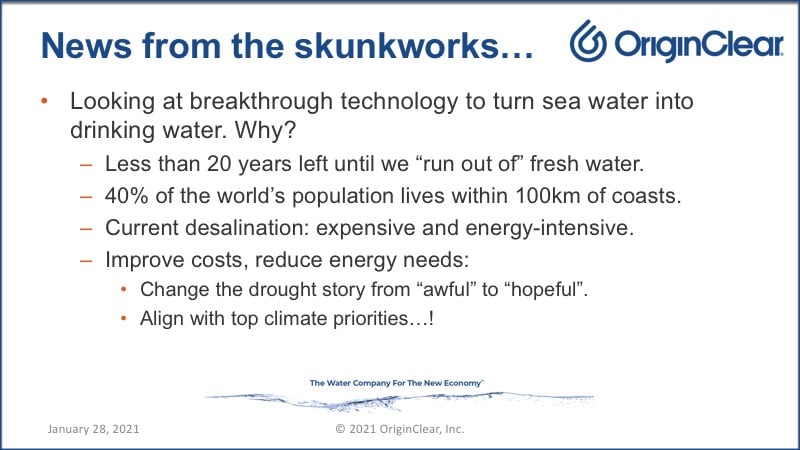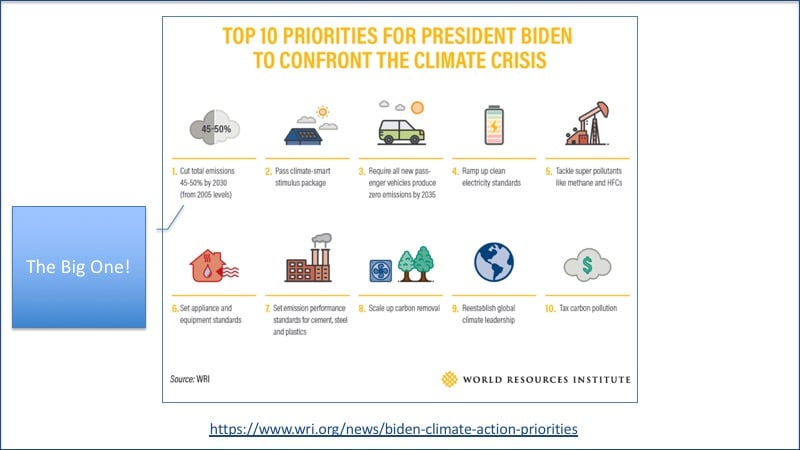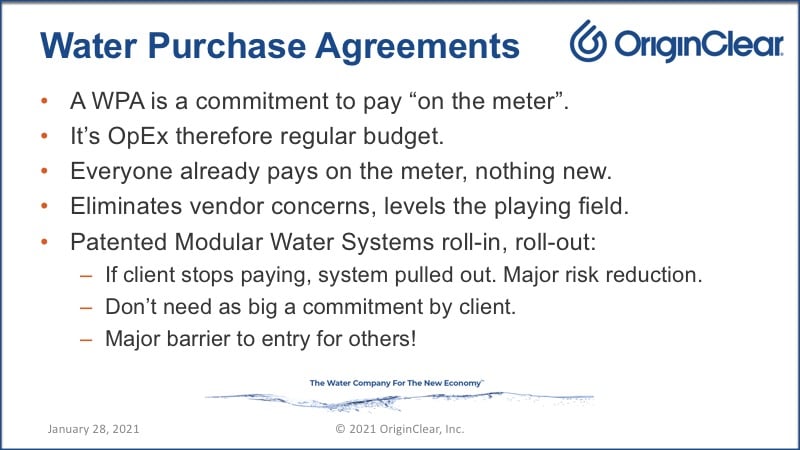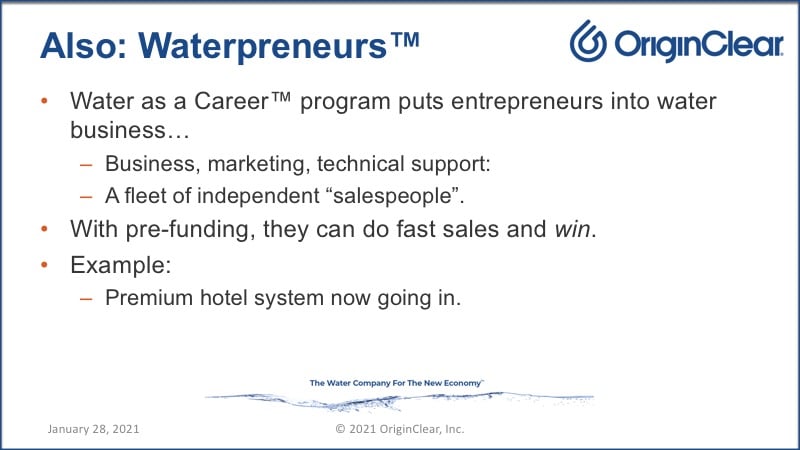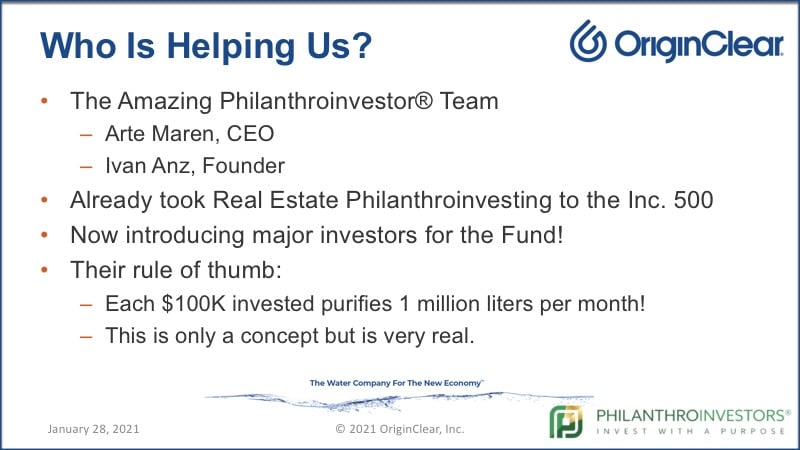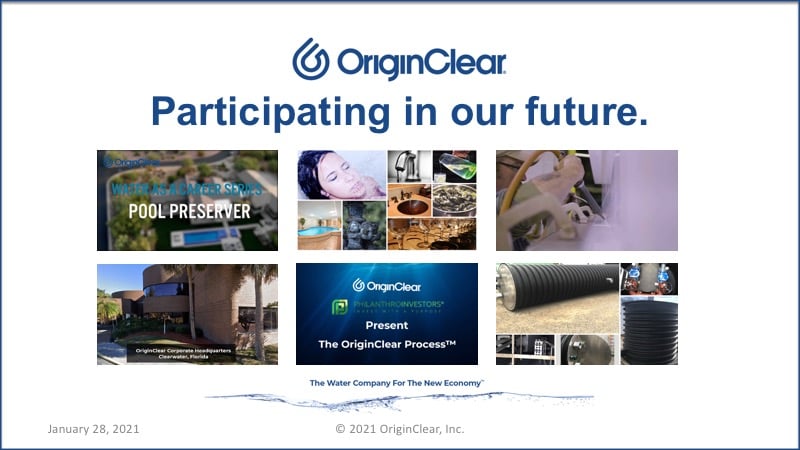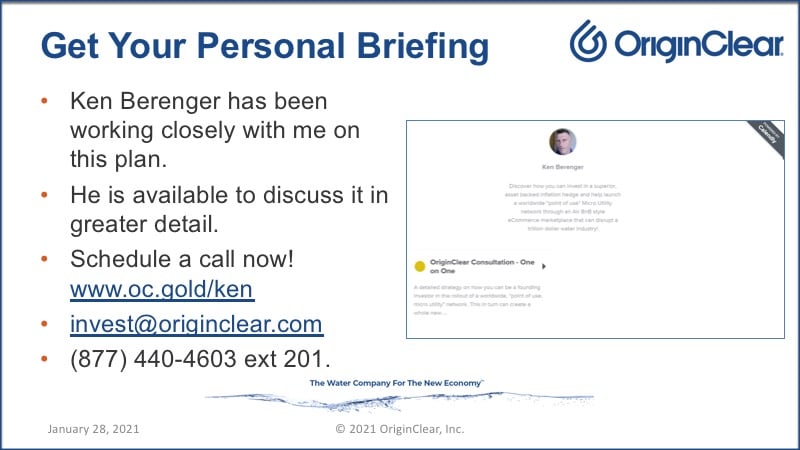Water is the New Gold: Insider Briefing of 28 January, 2021
Helping You Thrive in the World's ONLY Vital, Scarce and
Recession-Proof Market
How can we speed up slow water deals? And what does that have to do with OriginClear Finance? And how do Modular Water's roll-in and roll-out systems open the doors to it all? We showed the three steps that can quadruple our number of income streams...See why we believe 2021 is our big year!
FEATURED OR COVERED IN THIS BRIEFING — QUICK LINKS
- OriginClear Chief Engineer Dan Early talks about our advanced technologies that handle biofilms and pathogens like legionnaires disease.
- More on biofilms, what they are and why the technologies recommended by Dan Early are effective in handling them.
- First ever public discussion of OriginClear's decade long relationship with the State Department and water systems for overseas embassies keeping our people safe.
- A drill-down into the bipartisan infrastructure directives that were already in the legislative hopper BEFORE the election, what they mean and how they play out in practical terms.
- Straight talk from COO Tom Marchesello on decentralization and how it is affecting all of us.
- The symbiotic relationship between all water industry professionals and how we are working together to implement solutions that improve water quality for all.
- The power of "Made in USA" and influencers that are incentivizing domestic solutions.
- The innovation and efforts geared to making leaders. Where are they showing up?
- What is brewing in the lab...a look into OriginClear's skunkworks and technology in development.
- The most important and pressing concerns of the new presidential administration and how they relate to the water space.
- Why funding is the topic of the day, how key it is and how it can solve slow water deals.
- The biggest problem in water, why it exists and what can be done about it.
- What is a Water Purchase Agreement (WPA) and how it can dramatically affect the water industry.
- OriginClear's sewage and closed loop blackwater treatment systems.
- How OriginClear's roll-in, roll-out Modular Water Systems™ shorten the usual WPA cycle and reduce risk.
- Why pre-funding water projects is critical and what it enables.
- Exciting news on building OriginClear Financial and what that means to our operations.
- One simple process that generates four income streams.
- Who is helping us and how.
- How you can participate in bringing clean water to all people.
Transcript from recording:
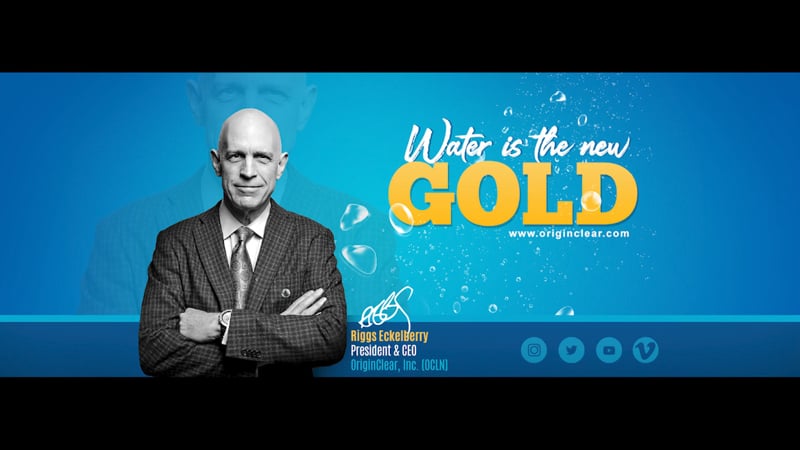
Introduction
Riggs Eckelberry:
Good evening, everyone, and with me I've got Tom Marchesello, who's promoting Tampa Bay. Why are we promoting Tampa Bay? What's up with that?
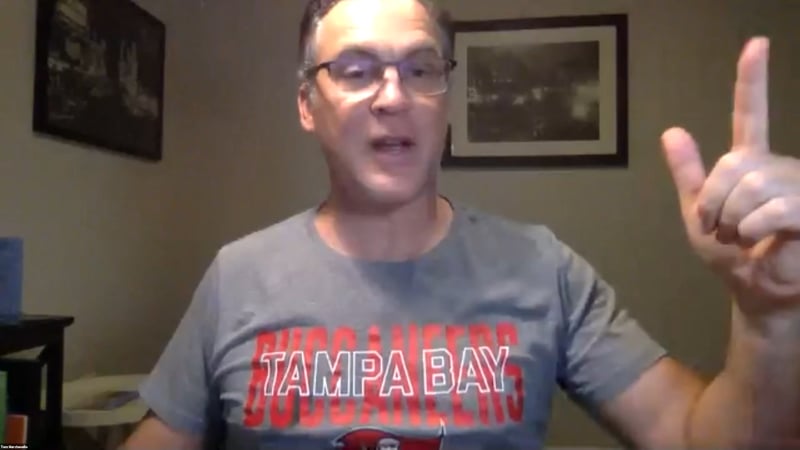
Super Bowl
Tom: Let's go Bucs, Super Bowl. First time ever the home team gets to play at home in the stadium, how about that?
Riggs: I heard a joke, this guy... You saw that joke today? The guy goes, "I have this ticket to the Bucs and it's box seats and everything. And unfortunately, it's also my wedding, so can someone take over for me? She's waiting at the altar."
Tom: It's kinda off but...
Riggs: It's kind of off color, but hey. Anyway, so thank you all for joining. We've got a very exciting show. Lots going on in fact. I see people still arriving, but I'm going to start right away with, well, in fact what I'm going to start right away with is our usual opener, Water Is The New Gold. And then I have a quick video with Dan Early, Dan The Man, Dan Early.
Presentation Video — Dan Early
Dan: We are working in the hospitality sector, Tessa, with some customers. These hospitality customers, hotels, and resorts. They understand that when they are taking, when they're deriving source water from public drinking water systems, they know that they need to implement this type of technology.
So we have several customers right now, where we are providing point of use, reverse osmosis and advanced drinking water filtration systems to take drinking water and to ensure that the institutional customer, that resort or that hotel, that they have safe drinking water for their system, for their customers. So we do, we personally are now deploying, we are seeing, and we are deploying these types of solutions to those types of customers.
Another example would be where we are working, where we're supplying decentralized drinking water systems for department of state customers. So I say department of state, I'm talking about embassy facilities and consulate facilities overseas, US embassy facilities.
In those instances right there, the US government goes overseas and they take their ambassadors and their staff over there, and they occupy an embassy facility in a foreign country. A lot of times they are bringing, they're deriving their drinking water from the public water supplies of city of London or New Delhi or places like that.
But then they get in these far-flung places, in Subsaharan Africa, and in Southeast Asia where the infrastructure is not there. They still have drinking water systems, but man, that is, you are taking your life into your own hands. I mean, Mexico is a neighbor of ours. And they say, when you go to Mexico, don't drink the water. There is a reason why they say that. So we are deploying these same technologies, doing the exact same thing at that level. Yes, we are. Those are two classic examples of where we're doing this.
End of video presentation
The Problem With Biofilms
Riggs: So let me set the stage here. I kind of threw this at you, but as you recall, we've been talking about the problem with biofilms. And so this is a quick clip from, and unfortunately, I'm sorry, it's a Zoom of a Zoom. So you're going to... It's pretty blurry. But what Dan is talking about, I really wanted him to start talking about how we are helping with this enormous biofilms problem. Tom, you were in that conversation. Would you like to relate a little bit of what the context was?
Tom: Yeah, there's two simple answers, which is we are working in that all the time through using reverse osmosis, which is the most viable technology that deals with biofilms because biofilms made up of bacterias and fungus's and things, have particulate matter of a certain size. So it means it's substantial.
You can put a filter in place and block that contaminant from coming through your water system and remove it. So our reverse osmosis technologies and filtration systems are the number one guard you have to put onsite at locations like hotels, or hospitals or military bases to prevent that kind of contamination.
Riggs: Yeah. And this is the first time we've really been talking about the work that Dan has been spearheading with this department of state. And of course they're operating in strange places like Afghanistan and so forth, where water is dodgy. And so not only biofilms, but high bacterial levels, streptococcus, et cetera, viruses. So tell me a little bit about how without naming names, of course, how much do we do this kind of governmental state department stuff?
Tom: Right now we're over a million dollars of that exact product line, right now, actively producing. So, I mean it's substantial. I mean, we're always producing, I'd say about four or five units that are going into places like this. So it's good. Good work.
Briefing #95
Riggs: Nice. Yeah, it is good work and it's growing, so our partner there is excellent. Well, thank you. I'm going to now go into the actual presentation and I just wanted to get the clip out of the way. I think it's fascinating what we're doing, the stuff that Dan is doing, this was... The interview was actually for an article that is going to appear in a water trade and the deadline is literally tomorrow. But nonetheless, Water Is The New Gold, helping you thrive in the world's only vital scarce and recession-proof market. Briefing number 95.
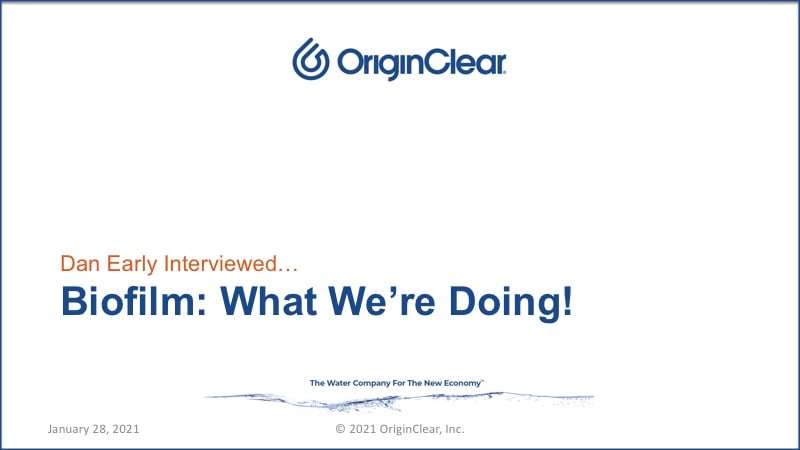
What We're Doing
Further on, we have the forwards looking statements. You've heard this before and I won't go into it. And this is that biofilm interview that I was just talking about, which is obviously fascinating. There'll be much more of this as we develop the story, because it's pretty key.
Bipartisan Legislation
Now, before we go on to some of the meat of the briefing, I wanted to talk a little bit about what is coming in terms of the new administration. And interestingly enough, there's bipartisan legislation coming out. This article was written the day before the election. So nobody knew yet what the administration was going to be. And so it was published, I think, on November 3rd and what was obviously COVID-19, fine, and tax proposals. So the two things which are not really germane to us, but there's two that are, and they're very, very important.
So let's unpack these a little bit. First of all, infrastructure legislation from this article, both parties know the value of infrastructure spending, stimulate the economy, et cetera. Very likely we will see infrastructure legislation passed in early 2021. And that, Tom, we talk a lot about our decentralization work and so forth, but we have a heck of a lot going on with municipalities and large corporations, right?
Decentralization
Tom: Absolutely. I'd say we're at least half, half on both ends, because we're always dealing corporations and industrial clients who need to do their on-site work. And then on the municipal side you're dealing with state or city or small town level projects that always require updates, upgrades, changes to systems.
Everybody's dealing with the infrastructure issues, aging infrastructure, lacking infrastructure moving of people from the North to the South. There's just this boom going on of having to deal with infrastructure issues and they're laggard issues when they may have put off those issues too long, few too many years, and now they're faced with it. And they're like, "Oh my, we really got to do this."
Riggs: Yeah. We talk a lot about the new trends and I recall it, like it was yesterday, you presenting at the WaterChain symposium we had in 2018 and showing the two buckets of the centralized stuff and the decentralized stuff and how the decentralized stuff was going to grow. But still the centralized stuff is a big piece of our business. And I think this is going to be very helpful.
Symbiotic Relationship
Tom: Well, they go together. I mean, you're not... You'll always have a symbiotic relationship in the industry. The water industry is a big industry that has needs on all ends. Just because something's decentralized doesn't mean it's not participating. The truth is everybody's learning from each other and then implementing best solutions that help each other.
Over time these systems have gotten smaller and cheaper and more compact and efficient to where they can be deployed to a commercial location versus in the past only governments could afford to do that.
The simple topic of desalinization or reverse osmosis, those are only the things of government dreams and then eventually big government spending and city spending. And now, because the technology is so matured after 20, 30 years, now you could have one in your house. Like it's really the technology curve, just like every technology curve allows it to happen.
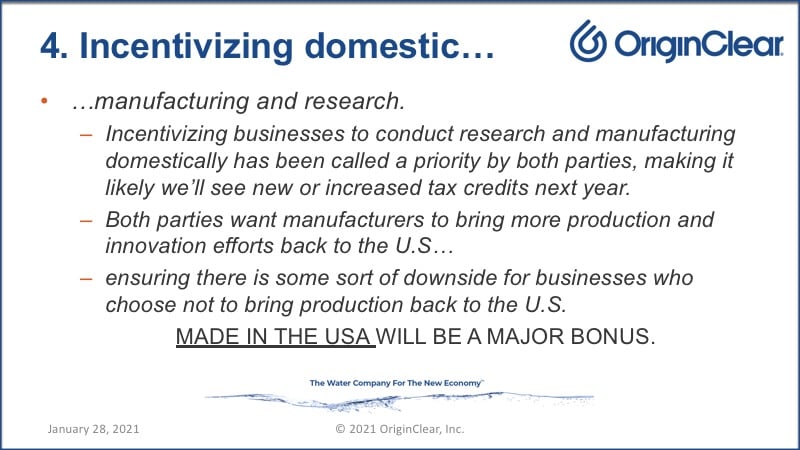
Made in USA
Riggs: Hundred percent. So then we have the second thing, and this is... I think you're pushing very heavily, Tom, which is Made In USA. Instead of asking businesses to conduct our research and manufacturing domestically, and both parties, obviously... this is really interesting, We talk a lot about division in our country, but Donald Trump wanted, was trying to bring business back to America. And what's one of the first things that Biden said in his administration this week, was, "We want to bring manufacturing back to the U.S.." So they both want the same thing and I think that's very important.
Tom: Made in the USA is profitable for the USA obviously, right? When you're a manufacturer and you export products out, you make the money. I mean you don't want to be the guy importing and paying the tariffs so, but in the end of the day, it's also just good business because it brings high skilled labor to the United States. Also brings innovation because we're innovators in the U.S. and we tend to put more money into our R&D and then create even better products, which then get more streamlined. So it's a real win for us across the board.
Innovation and Leaders
Riggs: That's a really good point you make Tom because when I was raising my son, who just turned 23, back then he was at a private school where there was a tremendous amount of demand from China and Korea parents to send their kids to an American school to get out of the rote learning thing, to learn something more outside the box and to become leaders basically.
And I think that's where we forget that the United States is a leader in terms of innovation, in terms of this perhaps less regimentation. Now, of course, it makes us problem kids. Not that my son was ever a problem kid, but you know what I mean, is that along with some of our tendency to misbehave, we're also pretty good innovators. Look at Elon Musk.
Tom: Elon Musk is the perfect poster child. Bill Gates, Steve Jobs, pick one. I mean, these guys understand the whole concept of not just opportunity, but also working hard and making a product and making it getting out there with it.
They are like this is what we're great at in America. We're innovative. We're smart. We're capitalistically minded. Like those are the good things. That's the reason why we even have stock market. The whole idea is you put money into things that allow it to grow because you're taking a picture on how things are going to grow into the future and I'd bet on America every time. I mean, that's the easiest plan that always works.
In The Lab
Riggs: Amen. So with that said, and I just want to quickly cover the big picture of how we are part of this new trend, but there's an even bigger part that I'm going to talk about now and this is very, very early. Literally this has been developing and I always like to tell you that we're the most transparent public company around.
So, we have what you might call a skunkworks. What is this skunkworks? That was Lockheed had the old skunkworks. They call it that because nobody in the advanced technologies department washed. So, they kind of turn into discover, but there's some stuff happening here.
We're looking at breakthrough technology to just turn seawater into drinking water and that's because you have been going on about 20 years until we quote unquote, run out of freshwater meaning major, major disruptions and loss of life and so forth. And the link is at the bottom there and common dreams. And for sure what we're working on on the main line is the recycling, the more water treatment, all that stuff.
OriginClear is a Platform
But there is something very important and that is we have 97.5% of the world's water is salt and 40% of the world's population lives within a hundred kilometers of coastlines. So there is an interesting opportunity here where we have there is really interesting technology and it has not gotten out of the lab yet. It needs to.
Well you know what OriginClear is a platform and I think we can do something here. Now isn't it interesting how current desalination is not only expensive, but it's very energy intensive and what is the focus of the new administration? Well, I'll show it to you right now on screen.
Breakthrough Technology
What's the big one? Number one, cut total emissions by up to 50% by 2030. That is just eight years from now. That is a huge goal. You look at what's happening in Saudi Arabia. They have these huge desalination plants and they have very cheap fossil fuels and so forth, but these things are not the sustainable way to make fresh water.
So there's something to be gained from doing something about turning, as I was saying, breakthrough technology to turn sea water into drinking water. You will be hearing more about this. None of this affects, Tom, this has nothing, as I briefed you, this is nothing to do with what you're doing. It will be done completely, like I say, in the skunkworks. It has nothing to do with the fund that we're developing, et cetera.
This is an important thing that I think is going to make a huge difference. You know, it's really interesting. There's all kinds of things you can do with water, but people look at the ocean and they go, "What the heck is all this darn salt water?" And I get email all the time about what about desalination? Well, we're going to be taking a look at this and there'll be more to report on it.
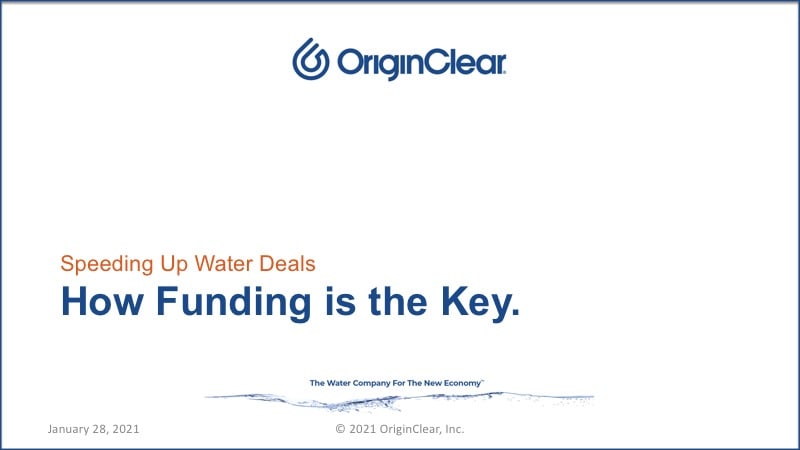
Topic of the Day
Okay. Now here's the topic of the day and how funding is the key to speeding up water deals and I'm going to just check... Oh I checked chat and somebody from D said, "Wow," so that is super cool. I'm just checking here. Okay. I was just checking participants. Lovely to have you guys on board.
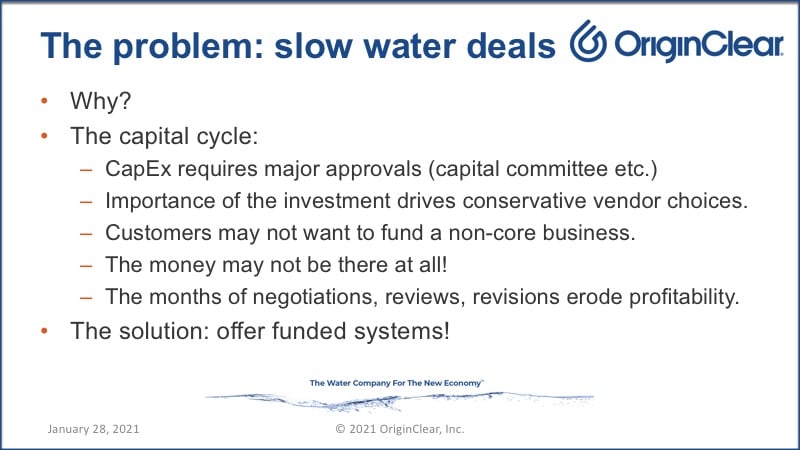
CapEx is a Big Deal
So, the problem is the slow water deal. That is something that Tom, you and I have lived with that there's that classic hotel deal that you did that we now have that we're going to be delivering this quarter, but I think you worked on it for like a year and a half. It was ridiculous.
Tom: Yeah. We did a lot of proposals, multiple hotels until one really stuck in there. Yeah.
Riggs: Well, one of the things that happened of course, because it was a big capital expense is the minute the chief engineer bought off on it and sent the mandate down to all the hotels, every hotel had to prove that they had a better approach and we had to work our way through all those, right?
Tom: Yeah. No, but they do count it, like you said, it's a capital expense and they're just going, "Yeah, but," and they were debating whether how to make this all fly through. And then they had to redo their numbers and eventually they figure it out, so it gets budgeted.
Playing it Safe
Riggs: Yeah. So that's the first one, CapEx is a big deal. Number two, this is an important one for us because the more important the investment, the more they want to go, "Wow, we'll play it safe. We'll go with a big guy."
Now the big guy or girl because American Water Works is there's actually a woman who's I think a chairman or CEO, but anyway, I don't want to be... There's a lot of men in Water, but there are women too, but the tendency is to go, like what they used to say in high-tech, you can never be fired for choosing IBM. Even if IBM was crappy, you would never be fired.
So for the innovative solutions, these big CapEx decisions actually work against us and it makes it harder.
Non-Core Business
The other thing is that there's resistance. This is not my business. I don't treat water. Why am I trying to do this? So they tend to resist it. They may not have the money or the credit, or they may not want to do personal guarantees this and that. And the final problem that you and I have seen Tom, is that these go on for months and months and months meetings, on-site negotiations, redrawing, everything. And after a while, where's the margin?
Tom: Yeah. They're asking the question.
WPAs
Riggs: Now, the solution that is to fund the systems is something called a Water Purchase Agreement, the WPA. It's like what they have in solar, which is the power purchase agreement. You've heard of SolarCity, well that's very much the kind of model.
It's OPEX meaning is it's like paying rent. It's just you're paying on the meter or there's the water bill. We're going to pay the water bill, no big deal. And also because the vendor is already offering the machine up front, then there's no concern about whether the vendor is big enough to cover the deal and so innovators tend to bubble to the top. This is the final point. It's really important and I think is a major differentiator for us.
Reduced Risk
Normally WPAs work with very long cycles. We're talking 15 years. Like if you look at the example of our friends over at Cambrian, because they have to, they're putting the system in the ground or bolt it in. Well, if you can repossess then you can have shorter term agreements.
And that reduces risk. You don't have to be quite so demanding of their commitment and so forth. And it makes it harder for others to do, because remember the technology we've licensed is patented and five excellent patents by Dan Early, and the stuff is good.
Treating Sewage
Gina Lowe is asking a question, "You're talking about water, will there be a plan by OriginClear to treat sewage?" Well, of course, and that, Gina, is a very good question. We do that all day long. In fact, what's little known is that we actually do a city deal. We've done a couple cities in the last year or two, and that is straight out sewage treatment.
In addition, we had that wonderful project, remember Tom, up in Pennsylvania, where there was that car dealer. Tell that story a little bit.
Closed Loop Systems
Tom: Well, there was a automobile dealership that had a desire to do a closed loop system, which means any wastewater produced onsite from toilets to car washing to grease trap water, could be recycled through the unit then pushed back into the system and be used for toilet water or wash down water or irrigation water.
So you basically get to close the loop it and use it again. Which is pretty innovative actually and that really reduces their use of water and their costs on water. And also basically reduces their burden on the infrastructure, the local community infrastructure. It's a win-win.
Riggs: So all that closed loop treatment and so forth, getting people off the grid... Cutting the cord in a water way is very much what we do. And that again, is what we're talking about when we're getting into these water purchase agreements, because people are not just buying water coming in. They're also paying for the water being treated. So that's what that's about.
Cleaning Gray Water
And then Gina has a follow-up question, cleaning gray water. Absolutely, we have... Those are called the purple pipes and the purple pipes, where they're separated... In America we don't always have the plumbing separate between black and gray water. Where it is gray, it's very easy to treat for irrigation, and that is actually... The world leader in treating gray water is Australia. They had a major drought about, 10, 12 years ago, longer actually, now 20 years ago.
And they went thoroughly into gray water treatment to water their lawns and so forth. And we've got the technology, but all too often, the gray water pipes are not separate unless the building is much newer. So yeah, we love doing that. And Gina these are great questions, so carrying on here... Let me talk a little bit about the cycle.
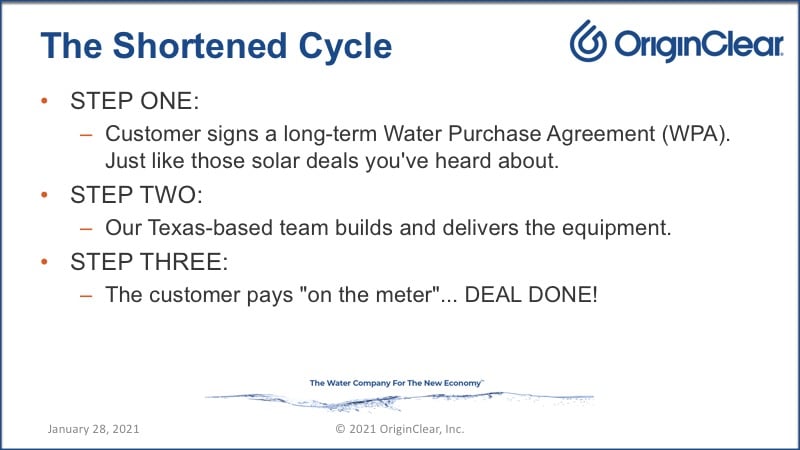
Three Steps
Now we have a shortened cycle where customers signs a long-term water purchase agreement, WPA, just like those solar deals. And then of course we build it and the customer pays and the meter deal is done. That is a very fast deal. So what does that mean in terms of revenues?
Septic Tanks
Gina you're asking all the great questions. So, "Could you replace septic systems, is that economically feasible? " Very good question. Here's what's happening with septics. Septic's cheap for sure. Now there's several problems. Number one, increasingly FHA, that Federal Housing Authority is more and more prohibiting septic tanks by making it... They have to be farther, the drain field has to be, I don't know, 100 yards from the well, things like that. There are regulations that are locking people out of FHA loans if they go with septic tanks. There's that.
The additional problem is that we have a lot of problems with viral loads and these days we've become very sensitive to viral loads and so we can replace them. Is it more expensive? Perhaps so, but I think that it's going to happen more and more. So with that, I'm going to continue, but these are wonderful questions. Thank you, Gina.
Water as a Career
Now another big reason, and this is another thing that we do specially, that other people don't. Water as a Career™ program, puts entrepreneurs into the water business. So we give them, we have a whole package we've built. It's a great career building package that we're going to review again, because it's going live on our website in the next couple of days. And what they are is like a bunch of Amway salespeople, but they're selling water systems and these are larger systems, right?
Pre-funding is Critical
But think about this. If I go to sell to a hotel and it's going to take me a year or a year and a half to sell the deal, well, I'm not going to last for a long time as an independent sales person, not going to happen. So pre-funding is critical to making these Waterpreneurs succeed because they can come in and go, "Hey, I've got a system, here it is, sign here and we'll get the thing going."
Reference Site
So let me tell you about this example because we have this premium hotel system now going in and we're going to be delivering it this quarter. I hope to be able to tell you more about it in detail. But that's a $140,000 system for a 212 room hotel, luxury hotel, all the water going into that hotel will be super premium water. Great.
That is actually going to be a reference site for us. And from there, we can actually give that reference site to waterpreneurs who go out there. Secondly, they have a, like I said, they're fully specified, priced out, all the options a standard product. And we can now pre-fund it the way it works. Okay. All right.
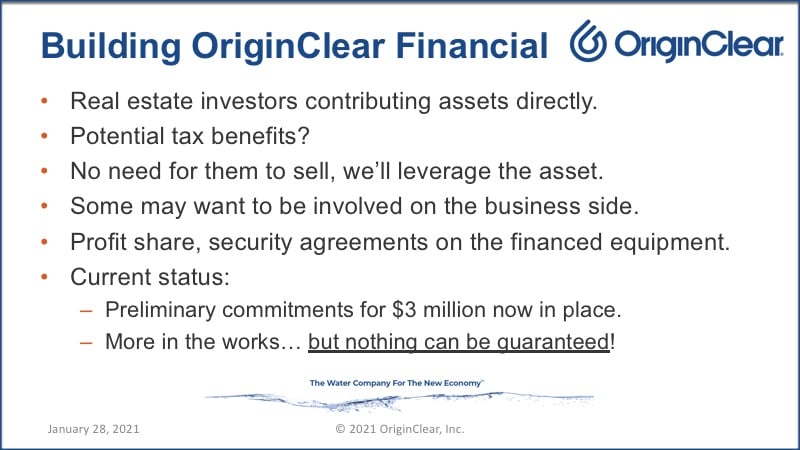
Building the Fund
So let's talk a little bit about this fund then. As you know, we're building OriginClear Financial. What's that about? Well, first of all, what we're tapping into is the real estate investors contributing assets directly. All right, now this is cool because instead of requiring someone to come up with a million dollars, we say, "You know what? You've got a property. You can go ahead, we'll do an asset purchase agreement. We'll bring the asset in.
"There will be potential tax benefits, that is to be determined." It doesn't always work, but there is ways for that to work. For example, share for share swaps, which defers taxes, things like that, there's variety of systems.
Leverage the Asset
And here's the thing. They can just go ahead and sign over the asset and we'll leverage it. Now they will remain secured because there will be security agreements on the equipment they've financed. So they'll have recourse on the equipment. And of course, they'll have a profit share.
Become Business Partners
We have some early indications that people want to be involved as business partners as well, not just passive investors. In other words, to go ahead and sell these Pondsters™ and so forth. That's I just heard today, Tom, was that we have these guys who; one investor who wants to take his property, put it into the system and then have a business that actually sends the machines out. So that's cool.
Preliminary Commitments
So where do we stand with that? We have these preliminary commitments, and as I've been reporting to you we have non-binding memorandums of understanding and we'll use for $3 million, they're good faith. And there's much more happening, there's up to $12 million more, but again, that we don't even have the MOU for that. So let's just say that for now, we have these good faith but non-binding commitments for $3 million, which is great news. Okay. Now, let's continue here.
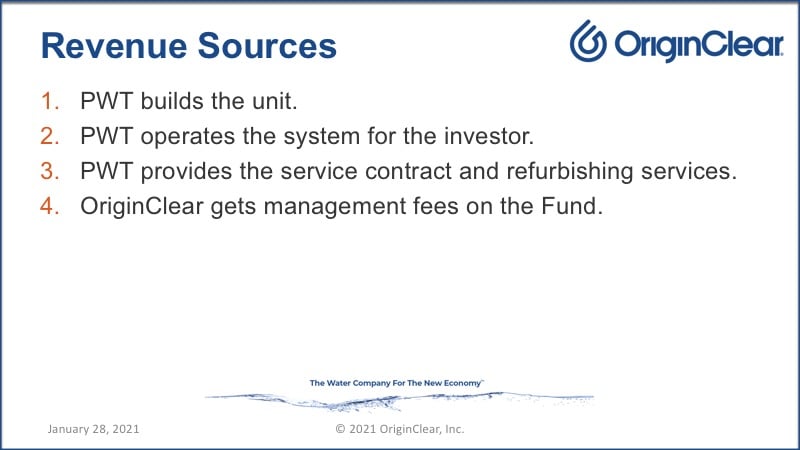
Four Sources
Revenue sources. This is something I want you to talk to, Tom, is these four revenue sources and how you see this as really growing our business.
Tom: Sure, no problem. So obviously, for dealing with water systems and you putting on a pay as you go model, the first fundamental issue is that PWT makes the equipment. So obviously if it's a drinking water system or some other type of unit, there's just a fundamental cost to it that we build a unit, we basically get that put on a truck and shipped out and sent to a location to be operated.
Operating the System
So we have the ability to operate the system on the location and, or place it with a subcontractor in the field. So often there's field operators out there who can basically do the installation and the maintenance out in the field as well. So we can have our folks engineer it and we can have subs basically managing it. So there's an entire supply chain there that basically lets people get paid to do work and services.
Servicing the Contract
Obviously then, we have to go back out and service the contract. Usually we put things on a five-year contract, is a fairly common thing too, for warranties and that includes annual maintenance or sometimes every three years maintenance for certain parts and labor.
Then there's refurbishment and replacement filters or housings and so forth, tubes and gaskets. So there's up-fit, kind of thing where, basically, we can either repair something for costs or we can even make upgrades. So, there's always an ability to continue to get some ancillary service fees as we go along.
Management
And then obviously OriginClear nets a management on deploying the stuff, because they are essentially the third party financier against this activity.
Riggs: Right now we only have number one, right? This is the classic formula, DBOO: Design, Build, Own, Operate. So far, right now, we only do design and build where we're giving up a huge amount of revenues. I remember back in the day we built a major, major frack system for someone and we just built it. No, no, it was actually an entire city in Texas. And then the other company we sold it for, that we were the subcontractor, they got all the revenue from operating a system for the city.
So here, this opens up both the operating a system and, of course, owning it. And then at the corporate level, you and me, we'll be managing the fund and get fair management fees. So that's the exciting part.
#83 on the Inc 500
So with that said, I'm going to tell you that unfortunately we have a rights problem. I wanted to get Ivan into this. He and Arte are doing amazing things for us. They are bringing these investors from their real estate base and they are doing amazing things to support us.
Their real estate venture is now in the Inc. It's number 83 on the Inc. 500 and is the #3 company in Florida, in all of Florida, on the Inc. 500. And they're doing the introduction work, very helpful.
Invest with a Purpose
We licensed their wonderful "invest with a purpose" process. And they have a rule of thumb, which is that when someone invests $100,000 in this future model—not the current one, because is the old school one, but the new school model—they invest $100,000 that purifies a million liters per month. So that's the concept there. That is a "save the world" kind of concept. It's a wonderful one.
Amazing Announcement
So, what I'm going to be doing here is, there is actually an amazing announcement that Ivan has, but I'm actually going to have to hold back on it. There is a huge announcement coming from something that Ivan has done to commit himself personally. He and his wife Bella are just doing something stellar for, in terms of committing themselves to the company. We're blown away.
I'm not going to get into it today because I wanted them on the show, and like I say, I think that there was a Zoom issue. That's fine because next week we will be able to announce it properly and we'll devote much a longer show to Ivan and what he's done here. I can tell you, it is super exciting.
You Can Participate
So, quickly, to just discuss how you can participate and Ken Berenger and I work super closely on all strategy. Literally, we talk several times a day and fortunately I do not have a jealous wife.
Call Ken
And basically, he has the inside track on what we're doing strategically, and he will of course never tell you non-public information that he shouldn't. He's very good about that. But he will give you more flavor and more context than I can possibly do in this call, and he is brilliant. I strongly recommend you schedule a call, oc.gold/ken in your browser. Talk to him. I believe you will have a very, very good experience.
Global Operation
Now, before I go on, there was also a chat request about doing water treatment outside of the country. And that question is a very good one. That's where this Department of State stuff comes in, for example, and now we're starting to expand with the Philanthroinvestor relationship. They're in 19 countries, and that, I believe, is going to bring us some deal flow even further.
We also have partners all over the world. We have a European partner with the animal treatment in Spain. We have a Romanian partner; a Middle Eastern partner who is actually the number one oil-services company in the Middle East, Al Mansoori; and also a major player in Oman that we're working with [Special Oilfield Services - Oman] ; as well as our wonderful partner in India, Permionics; and more. So, yes, we are all over the world, and obviously we're not just U.S.-centric.
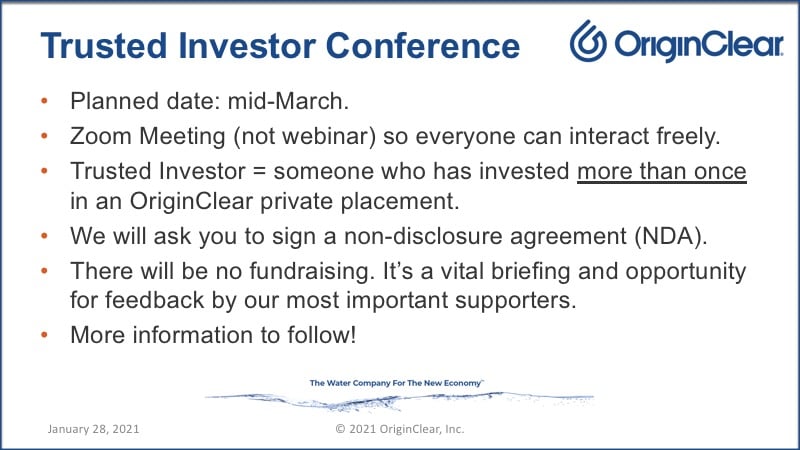
Trusted Investors
All right. I was talking about the trusted investor conference, and you will be hearing about this. Basically, if you would have invested more than once in an OriginClear of private placement, then we would like to get you in there.
This is very, very important feedback for us, and we will not be sitting there with a whiteboard getting the leaderboards going on, and you investing. This is not what this is about. We trust our investors deeply. You've really put yourself on the line for us, and as you know, we take good care of you to make sure that you are in good shape.
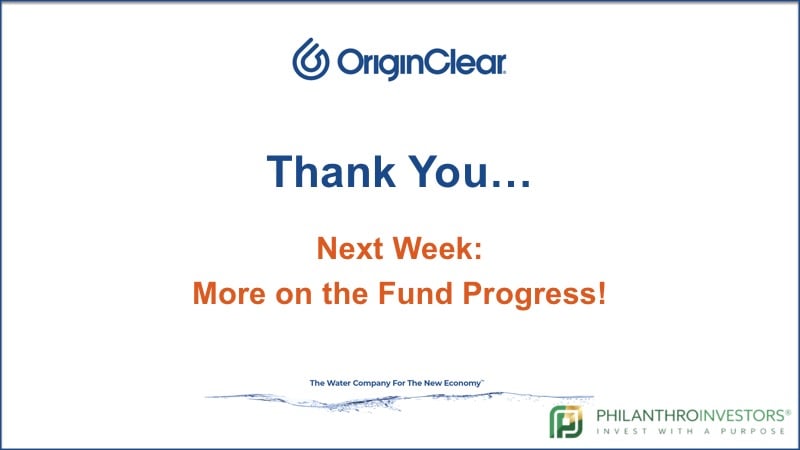
Next Week
So more on the fund progress next week, and specifically this news from Ivan, which I guarantee you, it will blow your mind. So that will be the end of the show tonight. It's gone a few minutes over, but I think it's been super exciting. I want to thank you all. Tom, it's really great, as far as Tampa Bay, since I'm here too.
Tom: Come on, baby. Tom Brady and Gronkowski and all the other guys, they brought a team together. It's been fun, so much fun.
Riggs: G-O-A-T [Greatest Of All Time] for sure. For sure. It's going to be a good game. It'll be fun. Good. Well, with that, thank you all. I appreciate it. We've had excellent attendance tonight. I am privileged as always to have that kind of attendance. You care. I love it. I hope I've given you a lot of information. There'll be more and more next week.
And I think this desalination thing is also going to grow into something interesting without disturbing anything that I've been telling you about, and from Star to the panelists, "Thanks for the information." You're welcome. And thank you all, good night, and enjoy your weekend.
Register for next week’s Insider Briefing: HERE
%20250px.png?width=250&height=53&name=OriginClear%20Logo%202019%20(RGB)%20250px.png)


